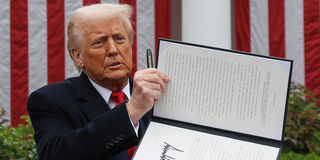Premium
In era of tariff wars, Africa must build self-reliance

US President Donald Trump holds a signed executive order on tariffs, in the Rose Garden at the White House in Washington, DC, US, April 2, 2025.
The announcement of new tariffs by the United States has sent the world into a spin. While this was not entirely unexpected, the depth and complexity of the retaliatory measures are likely to usher in a season of global uncertainty.
This may mark the onset of a global recession, one that will be felt in every corner of the world. JP Morgan has already raised the probability of a global recession to 60 per cent.
While the heavy punches are being exchanged among developed nations, Africa is not immune. The heat on Third World countries will be experienced at various levels. As global powers focus on their priorities arising from the trade war, little attention will be given to Africa.
The withdrawal of financial support in crucial sectors such as health, education and humanitarian aid is just the beginning. The fiscal holes created will have to be filled by already stretched exchequers. Critical programmes on reproductive health, HIV, malaria and tuberculosis, supplemented by USAID for decades, now face uncertainty.
In parallel, the race by global powers to deepen their industrial foothold and achieve competitiveness is another development with huge implications for the continent. With critical and rare minerals spread across Africa, there is bound to be a second scramble. Strategic positioning of global industrial hubs to ensure direct flows of raw materials from Africa will increase. While this might sound straightforward, there is growing evidence that such moves could be abrupt and even brutal.
In light of this, leaders across the continent must challenge the narrow perception of Africa as merely a source of primary raw materials and a market for foreign imports. But a greater question emerges: can a deeply indebted continent become independent in an increasingly self-centred global market?
There is a growing need for Africa to seize this moment and take charge of her destiny. The value of the minerals beneath African soil holds the potential to transform the continent into a strong and prosperous place, if only we can create the stability and systems that will enable the full realisation of our wealth. Minerals extracted in environments of war and instability benefit outsiders while locals continue to languish in poverty and suffering.
As foreign markets grow more complicated, intra-African trade becomes important. Currently, intra-African trade stands at just 14 per cent, a self-inflicted wound we must urgently heal. If we seek self-reliance in manufacturing, we must first be able to meet our own continental needs. A revamped pharmaceutical industry, for example, could support much-needed, low-cost healthcare. Can we take a ramshackle vehicle and improve it to global standards? Why not?
We must come to terms with the reality that the number of charitable voices has declined remarkably. In the world we are entering, you can only negotiate from a position of strength, not pity.
The writer is the Cabinet secretary for Investments, Trade and Industry. [email protected].


